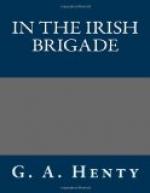“Still, gentlemen, you might, perhaps, wonder how it is that he knows no more of his family, and it was that this question might be disposed of, once for all, that I am making this statement to you on his behalf. He was not brought up, as you might expect, with some of his father’s connections. Whether the family were so scattered that there was no one to whom he could safely entrust the child, I know not, but, in point of fact, he sent him to one of the last houses where a loyal gentleman would wish his son to be brought up. We all know by name and reputation—I and your majors knew him personally—the gallant James O’Carroll, who died, fighting bravely, at the siege of Limerick. He was succeeded in his estate by his brother John, one of the few Irishmen of good family who turned traitor to his king, and who secured the succession to his brother’s possessions by becoming an ardent supporter of the usurper, and by changing his religion.
“Why Murroch Kennedy should have chosen such a man as the guardian of his son is a mystery. Whether they had been great friends in earlier times, when John O’Carroll professed as warm an attachment to the Stuart cause as did his brother James, or whether Kennedy possessed such knowledge of O’Carroll’s traitorous dealings with the Dutchman as would, if generally known, have rendered him so hateful to all loyal men that he could no longer have remained in the country, and so had a hold over him, Mr. Kennedy can tell us nothing. He was brought by his nurse to Castle Kilkargan, and was left with John O’Carroll. It is clear that the latter accepted the charge unwillingly, for he sent the child to a farm, where he remained until he was eight years old, and then placed him with the parish priest, who educated him. The lad visited at the houses of the neighbouring gentry, shot and rowed and fished with their sons. O’Carroll, however, beyond paying for his maintenance, all but ignored his existence, showing no interest whatever in him, up to the time when he furnished him with a letter of introduction to de Noailles, except that he made him a present of a gun, as soon as he became of an age to use one. He never attempted to tamper with his loyalty to King James, and in fact, until he sent for him to ask what profession he would choose, he never exchanged ten words with him, from the time that he was brought to the castle.
“We can each form our own theory as to the cause of such strange conduct. He may have given a pledge, to Murroch, that the boy should be brought up a loyalist, and a true son of the church. It may have been that the loyalty of the boy’s father formed so unpleasant a contrast to his own disloyalty, and apostasy, that he disliked the sight of him. However, these theories can make no difference in our reception of Desmond Kennedy, as a gentleman of a good family, and as the son of a loyal adherent of the king; and as such, I think that I can, from what I have already seen of him, assert that he is one who will be a good comrade, a pleasant companion, and a credit to the regiment.”




